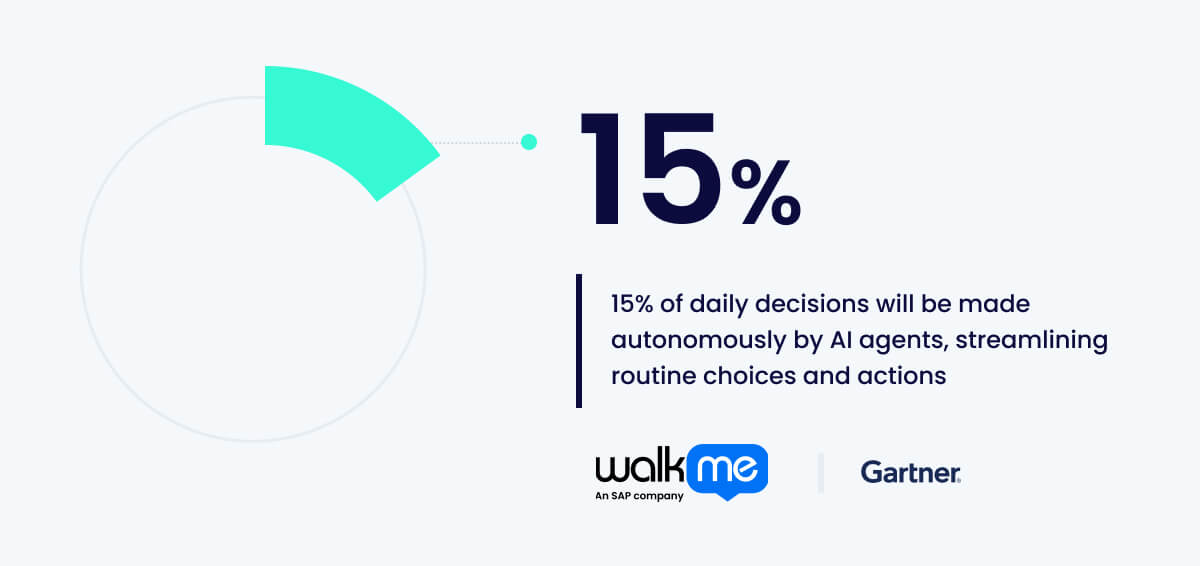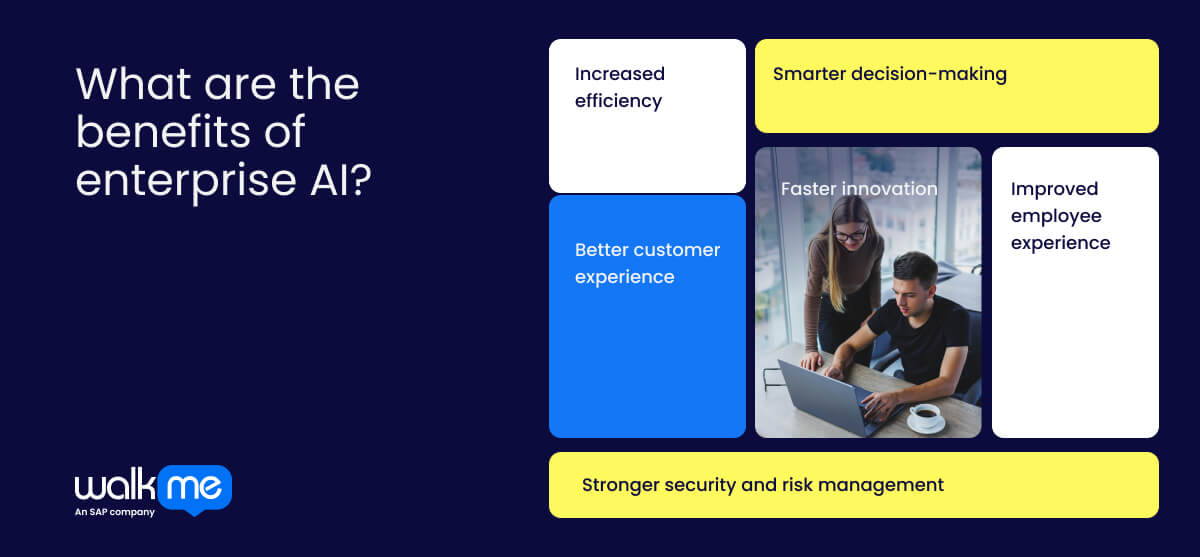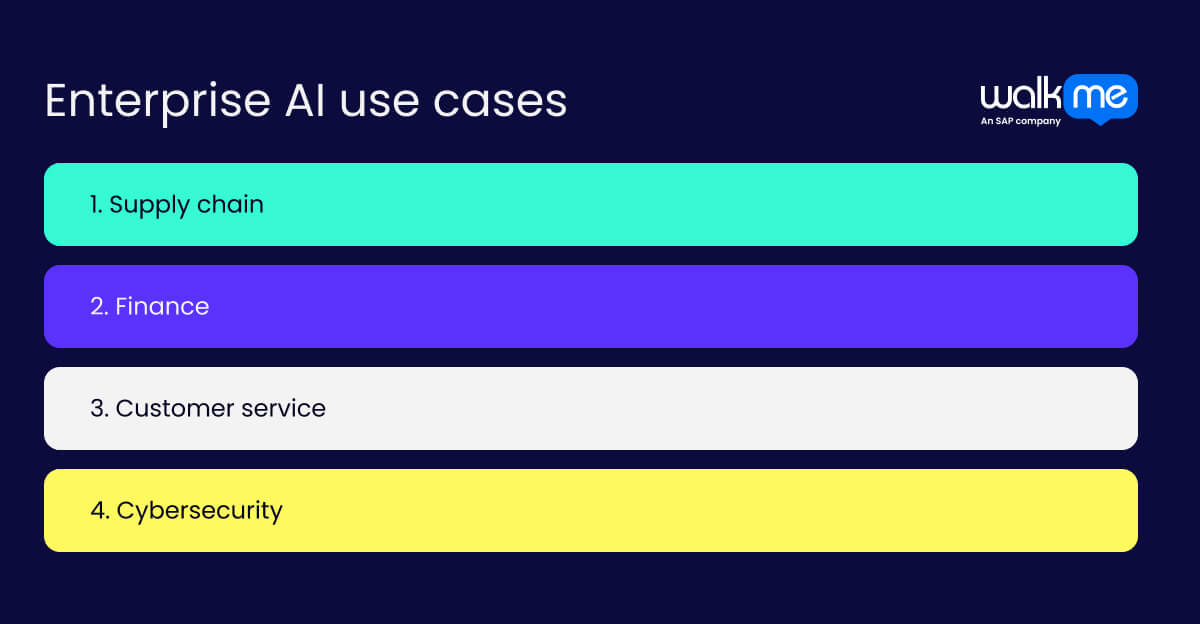What is enterprise AI?
Enterprise AI refers to the integration of artificial intelligence into a business’s core systems and processes. It allows companies to operate with greater speed and insight by solving complex problems and automating decisions.

Unlike basic automation or standalone tools, enterprise AI is used across multiple departments and functions. It includes techniques such as machine learning and natural language processing, which are applied daily to support more intelligent workflows and decision-making.
Organizations that have already invested in digital transformation and robust data practices are best positioned to benefit. They will already have key elements required for successful enterprise AI deployment: strong data infrastructure, support from leadership, employees who are ready for the change, and a culture of experimentation.
Why is enterprise AI important?
Enterprise AI helps businesses become more efficient and better equipped to scale. AI working across teams helps companies respond more quickly to market changes and uncover insights they might otherwise miss.
Despite the investment required, companies find that the benefits outweigh the cost. Enterprise AI leads to fewer delays, more consistent operations and improved customer relationships. These factors collectively contribute to long-term growth.
Deploying enterprise AI is also vital to remain competitive, as companies are implementing these technologies rapidly. ABI Research predicts that generative AI use cases in enterprise settings will create $434 billion in value per year by 2030 across 12 sectors.
Internal operations will be transformed similarly; Gartner predicts that at least 15% of daily decisions will be made autonomously using AI agents. The shift has already begun with tools like automated reporting, which create insights and summaries without manual effort.

What are the benefits of enterprise AI?

Enterprise AI is having a transformative impact on businesses, from operations to employee experiences. Here are some of the key areas where it is delivering organization-wide value:
Increased efficiency
Companies can use AI to automate routine tasks and enhance workflows. They can direct time and resources to other tasks while AI handles basic operations.
Smarter decision-making
AI systems can explore large datasets to surface insights for data-driven decision making. Companies receive reports at scale that uncover more advanced analysis.
Better customer experience
Industries use enterprise AI to deliver a more personalized service. Smart chatbots help companies serve customers without hiring more staff.
Faster innovation
Automating research and insights can accelerate product and service development. Teams can use AI-powered resources to test ideas and bring new solutions to the market at pace.
Stronger security and risk management
AI can flag unusual behavior and reduce fraud risk with continuous analysis and alerts, relieving the human burden and improving accuracy for highly regulated industries.
Improved employee experience
Employees have more time for meaningful work instead of repetitive tasks. They can also harness enhanced reporting and insights to make better decisions at scale.
What are the challenges of deploying enterprise AI?
While enterprise AI is being enjoyed by many businesses, there are challenges teams must be aware of before they implement their own system.
Below are some of the main obstacles to plan for:
Data privacy and security
AI systems rely on large volumes of data, and a lot of it will be sensitive. It is vital for companies to ensure that data is stored securely and complies with privacy laws, such as GDPR, to avoid security breaches.
Ethical and responsible use
Decisions made by AI can have a considerable impact; for example, a medical diagnosis or a loan approval. Companies need clear rules about who is responsible for AI decisions to use it properly.
Impact on jobs and skills
Employees may be concerned about job displacement if AI automates tasks previously done by humans. Furthermore, AI deployment increases demand for new skills, which means upskilling and workforce planning are vital.
Organizational resistance
Enterprise AI leads to new workflows, which employees may resist. Transparent planning, trust-building in new technology, and ongoing communication are vital to win employees over as part of effective change management.
Complex integration
Using legacy systems and workflows with AI can be technically demanding. Adding AI may require custom coding and additional work to ensure data consistency. Collaboration may be required across departments to complete the process.
Managing algorithmic bias
AI models can reinforce pre-existing biases if they are trained on skewed or incomplete datasets. Therefore, ongoing monitoring and training on diverse data is vital to reduce the risk and ensure outcomes are fair.
Enterprise AI use cases

Enterprise AI is already making a measurable impact across core business functions.
Here are some of the most common and high-value use cases:
Supply chain
AI predicts equipment failure before it happens. Businesses can shift from reactive to proactive repairs, making their supply chain more resilient. Machine learning models can forecast demand with greater accuracy, making stock management more intelligent.
Finance
In finance, AI helps make better decisions by analyzing vast amounts of data to identify risk and fraud. Advanced algorithms promptly identify unusual transaction patterns, working to minimize losses and safeguard both customers and company assets.
Customer service
Chatbots and virtual agents enable always-on customer support services. These AI-powered tools can handle routine queries and escalate complex issues to human staff. AI can also tailor product recommendations and provide refined messaging, enabling customers to benefit from personalized experiences.
Cybersecurity
Teams can detect suspicious behavior early with AI, which continuously scans systems for threats. IT teams also benefit from automated processes, such as ticket routing and infrastructure monitoring, which enable them to experience fewer disruptions and resolve issues more quickly.